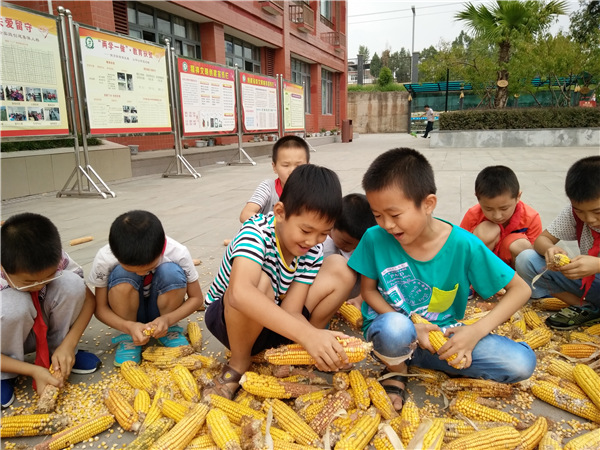 |
|
Fifth-and sixth-grade students at No 7 Primary School in Bazhong, Sichuan province, harvest corn that they'd planted. [Photo provided to China Daily] |
Li Guangjie's first major action when he took over as principal of the Central School in Fusong county's Xianrenqiao town in Jilin province's Baishan city in 2017 was to introduce new rewards and training for teachers.
Subsequently, 18 of the school's instructors won special recognition from the county, including two who were named "leading county-level teachers".
Moving forward
Another common theme is the difficulty of helping left-behind children like Mingda.
Many are socially withdrawn, ambivalent about schoolwork and lack confidence.
Nearly half-1,219, to be precise-of the students at Tongjiang No 6 Primary School in Bazhong city, Sichuan province, are left behind.
Principal Gao Huaiyang recalls feeling concerned about how "timid "first grader Luo Haoxuan was when he met the 7-year-old last year.
Gao talked with Haoxuan, and his parents and grandparents, and encouraged the boy. He also arranged for one-on-one tutoring with Haoxuan's Chinese-language teacher, leading to huge improvements in his reading and writing.
"Now, in the second grade, Haoxuan speaks boldly. He tells stories in class. He's more confident," Gao says.
Ten-year-old Liu Junliang grew up "in silence" since his parents weren't involved in his upbringing, Gao says.
His grandfather, who raised him, could only provide meals and wash his clothes. His parents had divorced. And while his mother had custody, she cared for other relatives, as did his grandpa.
"Grandpa accompanied Junliang to sign up for the first grade," Gao recalls.
"I asked, Child, where are your parents? He hung his head and didn't speak. He hid behind his grandfather."
When the grandfather explained the situation, Gao contacted the boy's parents and asked them to send their son videos every night. He encouraged Junliang in class and asked him to help with tasks he knew the boy could achieve.
And he bought the boy a book that addresses a lot of "why" questions about the world.
"After a month, Junliang's personality gradually became brighter," Gao recalls.
"Now, he asks me questions when he sees me: 'Teacher Gao, why are plum blossoms not afraid of the cold?' 'Mr Gao, do you know where I hid my lost baby tooth? "Mr Gao, why is the center of bamboo empty?'"
Ultimately, the stories in Levelling Mountain-high Gaps aren't just lessons for students and rural educators but for the world to understand the trials and triumphs of education throughout China's vast countryside.